Robyn Ryle's Blog, page 16
September 12, 2012
Re-post: No one said it would be easy
Not too long ago, someone commented on my blog that they liked my posts, especially the older ones. And of course, I thought, "Really?" Because we want to believe in a linear model of our life. The first posts were crap, but since then, I've gotten much better. Maybe not.
Here's a re-post of a very old post, written when I had first started dating my now-husband. With our second wedding anniversary coming up, it seemed appropriate.
I’m developing a new appreciation for the love songs that are about the things no one tells you, the hard work that can be involved in being in a relationship. Or maybe it’s not hard for a lot of people, and maybe it’s just the freakish people like me who have been on their own for too long. Nonetheless, I increasingly appreciate good songs about the hard side of relationships, what happens after happily ever after, and everyone rides off into the sunset, and real life starts.
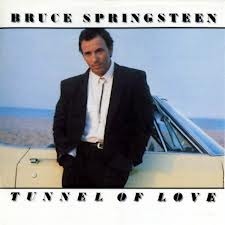
“The Cautious Man” from Tunnel of Love by Bruce. I know there are many people who think Springsteen has done nothing good since The River, and I know Tunnel of Love was especially hated by the critics, but I think this album is one of the greatest works of art on the subject of love in the 20th century. I kid you not. Love in the gritty, Jesus Christ, what the hell has happened to me and what do I do now, kind of way, but that’s important. “The Cautious Man” is an especially good representation of what I think is a basic truth about us as human beings. We deeply want to be with someone, to be close to someone, to feel that kind of communion and togetherness. But it also just scares the shit out of us. And for many people, those two forces can be equally strong. I want to love someone and be loved by someone so badly, but I am absolutely terrified of this at the same time, and sometimes every instinct in my body tells me to run away, go down to the end of the driveway in the middle of the night and contemplate the tattoos on your hand, “Love” and “Fear.” I had no real inkling of what “The Cautious Man” was about until I found myself in a relationship, doing the hard work of coming back into the bedroom at night, knowing that there’s a good chance those fears will never go away, but part of the hard work is sticking with it anyway. It’s comforting to me to think there’s no gender to what Bill Orton feels and men don’t have any copyright on restless hearts.

Another great, Jesus-relationships-are-hard song is Lucinda Williams, “Side of the Road,” off of Lucinda Williams. Same theme as “The Cautious Man,” really, only maybe Lucinda has a slightly better or different take on what it is that makes us wander towards those roads. I’ve been reading a lot about the institution of marriage and love in historical perspective. Love’s always been around in some form or another, but for a lot of human history, we’ve been somewhat suspicious of the romantic type of love that Lucinda and Bruce are writing about. It’s good and fine, this passionate, romantic kind of love, but certainly nothing for people to build their lives around. Certainly not a good reason to get married. It’s just us, in the West, recently who decided that yes, romantic love is the only reason you should get married. And maybe that’s what these songs are about. Trying to figure out how to go about doing this new thing. Taking a force that for broad swaths of history was seen as destructive and making it into something lasting and creative. It’s a modern problem, I guess, and especially for Lucinda, who I feel for. How scary is it, the idea of losing the sense of what it feels like to be in your own skin? To forget who you are without someone? When you’ve been burned that way once, when you did in fact, forget who you were without someone, how do you gather the courage to do it all again? But somehow do it in a way that doesn’t completely destroy who you are?

The last song only recently came to mind, as I sat down to write this, actually. I’ve been long trained since childhood to associate any phrases in my mind with songs, like there’s a little automated juke box in there always trolling for the particular melody that fits the emotional context flitting through my mind at the moment. So, “No One Said It Would Be Easy” popped into my mind this morning, by Sheryl Crow, from Tuesday Night Music Club. Here we get the nitty gritty details of two people trying to live together, trying to make this whole relationship work. Financial troubles, shirts on the floor, crappy cooking, and thinking to yourself, “Oh my God. Who exactly does he think I am?” Do you know that moment? When you think to yourself, what the hell has to be wrong with this person for actually loving me? I mean, we’re talking about me, here. Does this person have any idea who I am? There’s a good chance that if they think they love me, they really don’t, because trust me, I know me. Sometimes I’m not sure if I love me. How could anyone else? It’s a small verse in the song, a little bridge, I guess, but an important part of the scariness of love dynamic. We want to be known and loved, to be loved for who we are. But that’s scary, too. And when he’s looking at me, who is it he’s really seeing? We both want and don’t want it to be the person we really are, whoever the hell that is at the particular moment.
Thank god, or whatever, for Sheryl Crow, Bruce and Lucinda. Because no one else really tells you about these things. Are we afraid to reveal the fears we have about our own relationships? Is it just an easier story to tell, that all the hard and interesting stuff happens at the beginning? Or is it just too difficult a bridge to gulf between those who are in the relationships, staring down the road, and those who aren’t, which for many years, was me? I don’t know. I like these songs because they make me feel so not very alone and, well, weird. We don’t all head out to the road in the middle of the night, or stop alongside it. We do other, more creative things to try and push people who do or might love us away, because of how scary it is. And thankfully, I guess, some of us can sometimes become just self-aware enough to know that we’re doing it. And some of us not so much. I don’t have much to do with Christianity anymore, but I remember in Southern Baptist Sunday school asking my teacher what the purpose of our lives is according to god. Not an easy question for a Sunday school teacher, but I give whoever it was credit for the answer. He or she said fellowship. I’m not a theologist, so I don’t know what exactly that meant, but it seemed the explanation that I got was the purpose of our lives is to be with other people. That seems simple, until you begin to think about how incredibly difficult that is. Being with other people is some hard-ass shit, whether it’s your neighbor, your student, your partner, your children, your mother. We want to do it, but, really, sometimes doesn’t it just seem like such a bother? It’s good to just know sometimes that you’re not the only one who feels that way, that we’re all in this together, loving and hating it in the same exact moment.






Published on September 12, 2012 06:43
September 10, 2012
Madison Monday: Cat Town
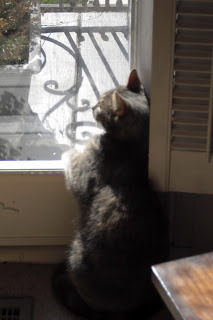
Gilly, longing to be outside
I seem to be writing about cats a lot lately on my blog. I think it probably has to do with their strong presence in my life. And by strong presence, I mean the fact that when I sit down to write at my desk in the morning, there’s a cat sitting on my computer. And there’s another cat sitting at my feet watching me expectantly. And when I lay on the couch to watch the first full day of NFL football, there’s a cat laying on me. When I do my morning yoga, I have to negotiate my downward facing dog around the cats swirling under me.
I tell my husband that though we only have two cats, it feels like a lot more. Sometimes they remind me of sharks in their constant motion, swarming around the house, waiting for one of us to show a moment of weakness.
In the mornings lately they’re particularly “attentive” to me because I’m the one who lets them out. For most of their lives in our house, our cats have been strictly indoor. Except for the moments when Gilly would make a break for it and run frolicking out in the backyard, they stayed inside. Living downtown, and fairly close to a street with a steady stream of traffic, I never felt particularly safe letting them out. And then there are the other cats.
I don’t know what it’s like for other folks living in downtown Madison, but sometimes I feel as if this is really Cat Town. The cats live here. They’re here to stay. We’re just visitors they tolerate. My evidence for this proposition?
1. The copious amounts of cat poop in my flower beds. I call it mulch. The neighborhood cats call it pine-scented kitty litter. They especially appreciate it in the spring when I lay down a whole new, unsullied layer of the pine-scented kitty litter for them. This prediliction of theirs makes sitting in your backyard smell like sitting in a large cat pan.
I have discovered that cutting up citrus rinds and scattering them around is something of a deterrent, as are coffee grounds. But it’s a losing battle. If a cat wants to poop in your flower bed, it’ll poop in your flower bed.
2. The cat opera. Before I lived in downtown Madison, and in fact, before the last year or so, I never fully appreciated the word, “caterwauling.” Now I realize this might be the most perfect word in the English language for almost exactly describing the insane noise that cats make when they fight and, well, the other F word. I’ve heard my own cats growl at each other and hiss. I’ve heard the really terrifyingly distressing meow that our cat can produce when she’s being driven in the car to the vet. But I had never experienced cat opera.
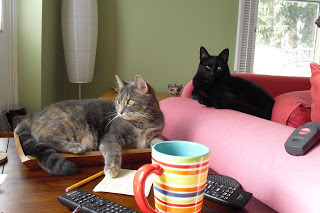
Ruling the world (and our house)
Cats are operatic in their volume and in the range of their vocal abilities. They are operatic in the pure overblown drama and intensity of their singing. Like opera singers, they sound like they are experiencing a range of emotions thankfully foreign to me. And like opera, it’s not something I really enjoy listening to, especially when it’s taking place right beneath my bedroom window. There have been nights when the caterwauling is so loud that my husband has gotten up to go downstairs, open the door, and add his own, more human, screams to their little performance, which stops them for approximately 10 minutes before they get going again.
3. The cat walk. On a more pleasant note, any walk around Madison is almost certainly bound to include some cat sightings. I like seeing other people’s cats, cats who live on the other side of town, and therefore poop in someone else’s flower beds and wake someone else up at 3 in the morning with their performances. Perhaps it’s true that cats at a distance are better than cats up close?
Especially if you’re walking around Madison in the evening, you’ll see cats sitting on stoops, crossing streets, prowling down alleys. Unlike dogs, they won’t bark at you or even wag their tails. At their most generous, you’ll get a meow. It’s more likely that you’ll get a short and disdainful glance. I like seeing cats as I wander around the streets of Madison. But I’m definitely not giving any of them my address.






Published on September 10, 2012 07:08
September 9, 2012
Mystery Book Review: Still Life

I’ve been in a bit of a reading slump in the month of September so far, so thank goodness for my friend recommending Louise Penny to me. I just finished the first in her Chief Inspector Armand Gamache series, Still Life .
These mysteries take place in Quebec, in this first book, in a little village just south of Montreal–Three Pines. It’s clear that from the outset Penny imagined a long relationship with her detective, Gamache, as well as with the residents of Three Pines. Already in the first book there are important things about Gamache’s life that are referred to, but not explained. And a hint at the possibility of further murders in the village.
Penny’s style is refreshing in that Gamache is not the center of the book’s universe. The story begins without him, amongst the quirky inhabitants of Three Pines. This village is populated by an odd assortment of people you might not expect to find in a small town. Several painters of varied levels of fame, a famous poet, a retired black psychologist turned bookstore owner, and a gay couple running the bed and breakfast. They are interesting and likable people, as is Gamache and his team of detectives (okay, except for one of the detectives, who is fascinating in her deep unpleasantness).
The frame of a mystery is an excuse for Louise Penny to tell some very human stories, and human stories are what I’m all about. Chief Inspector Gamache believes the best way to solve a crime is by watching and listening to people, so you’ll get none of the intricate expositions of forensic science here. What you’ll get instead is a wide array of characters giving voice to some incredible nuggets of wisdom and insight about life.
For example, Gamache tries to create a team of detectives who emphasize cooperation instead of the status quo of competition. He tells a new member of his team (the one with fascinating levels of unpleasantness) that there are four sentences she should learn to say and mean: “I don’t know.”; “I need help.”; “I’m sorry.”; and then he forgets the fourth sentence with amusing consequences. But those three sentences are some of the hardest things to say, and yet as Gamache suggests, some of the surest paths to wisdom if we say them with conviction.
The retired psychologist, Myrna, explains to Gamache why she retired from her practice. Some of her patients, she felt, were just not trying, and Gamache responds:
“Surely though, some were trying.”
“Oh, yes. But they were the ones who got better quite quickly. Because they worked hard at it and genuinely wanted it. The others said they wanted to get better, but I think, and this isn’t popular in psychology circles–“ here she leaned forward and whispered, conspiratorially–“I think many people love their problems. Gives them all sorts of excuses for not growing up and getting on with life.”
What an astute statement that seems to explain the difference between the people who gain wisdom from their experiences, and those who just hold tight to their problems with all their might.
One of the metaphors that becomes important in the last part of the book is the idea of the long house. Gamache remembers someone telling him that life is like a long house. You start at one end and move to the other, but you never leave that house, and neither do any of the people who were important in your life. The bully from elementary school may be all the way at the other end of the long house when you’re 35, but it doesn’t mean he’s not still there. It doesn’t mean you can’t still hear his voice yelling at you from the other end.
It’s an image that’s comforting and disturbing at the same time. It’s nice to think that everyone is still with you, but it makes that long house seem awfully crowded. And honestly, there are some people we’d very much like to leave behind.
Obviously, I’ll be following this series into the next book, which I’ve already got from the library. I can’t wait to see what happens next to Gamache and the residents of Three Pines, but I also can’t wait to see what further wisdom and insight Louise Penny has to offer.






Published on September 09, 2012 08:39
September 7, 2012
Why we should sweat the small stuff: lessons from my gender class
This fall will be my 10th year of teaching sociology of gender at our small college campus, and you’d think after ten years I’d know everything there was to know. But my students continue to teach me and sometimes to remind me in new ways of the things I already know.
Yesterday in class, we had our feminism conversation. This is the conversation in which we lay out what they believe about feminists, and then we compare that to what seems, based on the reading they’ve done, to actually be true about feminists. Did they ever burn bras? Maybe in the privacy of their own homes, but not, in fact at the famous demonstration outside of the 1968 Miss America pageant, where they mostly just threw bras and other oppressive items of clothing into a big garbage barrel. You might call feminists bra-tossers, but probably not bra-burners.
In this particular class, none of my students identified themselves as feminist, and their list of what they believed about feminism explains why. Feminists are man-haters, angry, easily offended, lesbians, and they make too much out of little things. The students didn’t say it this way, but what they mean is that feminists sweat the small stuff.
I’m going to read some subtext into the whole “make too much out of little things” here, based on my 10 years of teaching this class and being at Hanover. The students feel like feminists want to take away their fun. Feminists don’t want the fraternities to have parties like, “Surrender the Booty,” a pirate theme in theory, but with t-shirts featuring scantily-clad women, no one’s really being fooled. That the feminists on campus raised this conversation did not make them popular, as most of the men and women felt like fraternities should be able to put whatever they want on their t-shirts. So I would add to the students’ list another belief they have–feminists are party-poopers.
I walk a fine line in my gender class trying not to scare students away, and so we put up our two lists–what they believe about feminists and what feminists actually believe (things like, that there should be gender equality, that women should get paid the same as men)–and then we move on. Yesterday we moved on to a video that demonstrates the discrimination women face when they go to buy cars. On average, women are quoted prices $400 higher than men when they shop for cars. In this particular video, the man is able to take the car for a test drive by himself, while the women is told she can’t even drive the car off the lot by herself, and certainly not without the car salesman going along. Perhaps worst of all is what the car salesman tells the woman about new versus used cars. He explains to her that a used car would cost exactly the same as a slightly used car, because the slightly used car has been “broken in.”
We talk about why the car salesman acted this way, what his assumptions about women as car buyers are, and how that contributes to a larger system of patriarchy. Part of the point is that you don’t have to be grossly sexist in order to contribute to a patriarchy. All you have to do is follow the norms that are already set up for you in a patriarchal society.
In the course of thinking about other ways in which some of our everyday behaviors contribute to patriarchy as a system, one of the students had one of those moments. The moment when the little light bulb goes on. “It makes me think,” she said, “of what we said earlier about feminism and the small things. The small things do matter.” Yes, they do.
Often when we have conversations on campus about specific issues, like whether or not a fraternity should be allowed to wear sexist t-shirts or have parties like “Surrender the Booty,” we forget about this bigger picture. One word for this is micro-inequities. They look very small. So what, a woman has to pay more for a car? So what, she’s objectified on t-shirts? What’s the big deal?
The big deal is that small things add up, and they add up more quickly than you think. Marilyn Frye probably explained it best when she compared oppression to being inside a cage. If you just look at one bar of the cage, it certainly doesn’t seem like such a big deal. You can easily walk around it. It’s only when you can see all the bars together that you come to realize how your freedom has been compromised. If you endlessly debate the specific context of a sexist party isolated from any larger context, you’re probably going to lose.
Here’s to a good start to a semester of learning to see the bars that surround all of us.






Published on September 07, 2012 06:30
September 4, 2012
I'm So Lonesome I Could Cry
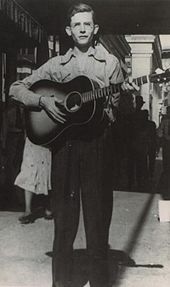
A young Hank Williams, with
an eerily familiar guitar
Don’t fear. I’m not, really. Lonesome, that is. With two full days of college classes behind me, I would describe myself as far from lonesome. It’s not easy for students to find my office tucked away up on the third floor of a rather neglected building on campus, but they still do. Especially during the first week when there are many schedule adjustments to be made which require an adviser’s signature.
This song is on my mind because as my husband and I prepare for our next performance, I have been playing the Hank Williams’ song, “I’m So Lonesome I Could Cry,” quite a bit. It’s an easy song as far as the chords on the guitar go. Mostly you just play E. The hardest part is going from E to B7, one of those transitions which you just have to do over and over again in order to get right. One of those transitions that works much better if you don’t actually look at the neck of your guitar while you do it. You think it would...you’d think actually watching your fingers make the change would help, but it doesn’t at all. I have to remind myself to look away, and still, I’d say at this point I only make it to a passable B7 chord about 50% of the time.
Had you asked me, say, three years ago if I would ever be playing and singing a Hank Williams song I might have laughed in your face. No way. Of course not. I don’t know what in particular it was about Hank Williams that so disturbed me. Maybe it wasn’t Hank Williams so much as his son, Hank Williams, Jr. Maybe, in fact, it was the poster hung on the wall of a fellow college student my freshman year that featured Hank Williams, Jr. super-imposed over a Confederate flag with the words, “The South will rise again.” That poster was rather disturbing, and somewhat confusing, to my Northern sensibilities. Also, Hank Williams, Jr. looked like the worse kind of redneck.
I have a theory that your aversion to looking like a redneck is directly related to how closely related you are to actual rednecks. If no one in your family is in even the slightest danger of being labeled a redneck, then what do you care? But if you have some rednecks in your closet, it’s bound to make you a little nervous. So, Hank Williams, Jr. made me a little nervous. I was, after all, one of the few people on my college campus from Kentucky. And yes, I can’t tell you how many folks pretended to be surprised that I was wearing shoes.
“I’m So Lonesome I Could Cry,” is a beautiful song, one I have enjoyed, ironically enough, since college when I heard the Cowboy Junkies sing their version of it on their album, The Trinity Sessions. But I never knew it was a Hank Williams song. It’s so damned poetic. Surely it could not have been written by a redneck.
Hear the lonesome whipporwill
He sounds too blue to fly
The midnight train is whining low
I’m so lonesome I could cry
I’ve never seen a night so long
When time goes crawling by
The moon just went behind a cloud
To hide it's face and cry
Did you ever see a robin weep
When leaves begin to die
That means he's lost the will to live
I’m so lonesome I could cry
The silence of a falling star
Lights up a purple sky
And as I wonder where you are
I’m so lonesome I could cry
The lyrics are haiku-like in their simplicity, but lyrical in their imagery–a falling star against a purple sky. In all the years of listening to the Cowboy Junkies sing this song, I don’t know if I ever actually heard the lyrics. In their version of the song, it’s less lilting country song and more bluesy dirge, but there’s no getting around the austere loveliness of these lyrics.

A different, Hank Williams, Jr.,
Confederate flag
Hank Williams the First is categorized as a country singer, but as a student of history I understand that what “country” meant when Hank Williams was performing is not the same as the stuff we call “country” today. You could make an argument that before Elvis, everyone was country. Hank Williams learned to play guitar from a black street performer named Rufus “Tee-Tot” Payne, a blues musician and the only person Williams ever identified as his teacher. “I’m So Lonesome I Could Cry,” sure sounds as much like the blues as it does like anything called “country.”
Hank Williams suffered from spina bifida as a child and battled back pain his whole life, leading to his untimely death at 29 from drugs and alcohol. “I’m So Lonesome I Could Cry” was inspired by his complicated relationship with his wife and manager, Audrey Sheppard. But knowing that Williams spent a lot of time in pain and had a difficult relationship with his wife doesn’t tell the whole story, does it? What was happening in his life when he sat down to write this song? What was he thinking? Was it fall, which made him think of dying leaves? Was he in one of those Southern cities whose nighttime is populated by the sound of train whistles? What specific moment of pain did Hank Williams transform into this beautifully simple song?






Published on September 04, 2012 14:50
September 3, 2012
Madison Monday: Hurricanes, presidential elections, and deja vu
It’s deja vu time this September in Madison. One of the first posts I ever wrote on this blog, way back in 2008, was about the effects of Hurricane Ike in Indiana. It was September, and the beginning of the school year at Hanover, and a presidential election year.
Four years later, it’s September, the first day of classes, there’s a hurricane affecting our weather, and a presidential election coming up. It seems as good a time as any to do my own little, “Then and Now.”
Ike versus Isaac
Thankfully, Hurricane Isaac is providing us only with some much needed rain, unlike Ike, whose high winds resulted in property damage and power outages all over the Midwest, leading the college to cancel the second week of classes altogether in 2008.
Not that cancelling classes is always a bad thing. Especially, say, on Labor Day, a day on which no decent American should really be working. I know there are a lot of folks out there who probably don’t particularly consider college professors decent Americans, or perhaps even define what we do as “working,” but that’s another post for another time.
How I was saved from being a crazy cat lady (maybe)
In 2008, I was still single and living all by myself in the house I had just recently bought, except for a very grouchy and deeply unhappy old cat. In 2012, I am married, living in the same house with my husband and step-daughter, and I have traded the deeply unhappy cat for two happy, if slightly neurotic, cats. But then, maybe saying, “slightly neurotic cat,” is redundant. Has my situation improved, then? That all depends on whether you think having two cats is better than having one, really an age-old philosophical debate. I will say that adding a husband and a child gave me much more to write about on this blog than just, say, cats.
What has Obama done for me lately?
I distinctly remember (and also, I wrote a post about it, so I don’t really have to distinctly remember) that at this point in the 2008 presidential election, I was obsessively checking the electoral maps of several different news organizations more than once a day. Much of my happiness hinged on what those electoral maps told me. At this point in September 2008, I was ready for it all to be over. The presidential election, that is. And possibly the life of the old and deeply unhappy cat, too, but certainly not my own life.
This September, I can tell you with complete honesty that I have not checked a single electoral map. My husband tells me that Obama is up in Florida, which is good. Or maybe it was Ohio. I don’t remember. I have discovered that one of the beautiful things about marriage is allowing someone else to carry the burden of anxiety from time to time. My husband is worrying about the presidential election for both of us. I’m worrying about global climate-induced apocalypse. It seems like a fair trade, and there’s not much we can do about either situation.
Also in the last four years I went on sabbatical; became a parent; wrote a book; learned how to play the fiddle, guitar and knit; had my first ever paid gig as a musician; had my first paid speaking gig; and sang in public for the first time since I was ten years old. Is President Obama’s list nearly as impressive? I doubt it.
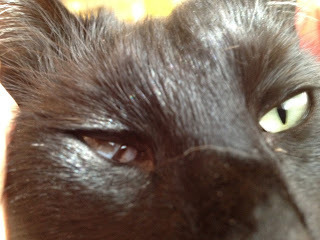
A cat in every pot--I mean, household
Still, Obama didn’t get in my way, and for that (and some other fairly important reasons), I’ll be voting for him again in November. Sometimes you can’t say too much about just being left alone, and I’m under no illusion that the other candidate has any intention of leaving me alone. Don’t be fooled; dismantling the government and leaving me alone are not at all the same thing.
But I’m a generous person, so who knows? Maybe President Obama can take some credit for my last four years of happiness, productivity, and the impressive doubling of my household cat population. I see a presidential slogan there–“Two cats in every house.” What the politicians won’t tell you–twice the vomit and poop.






Published on September 03, 2012 04:00



